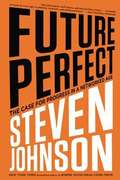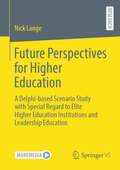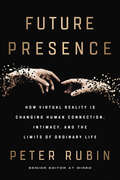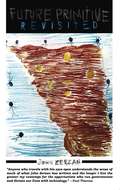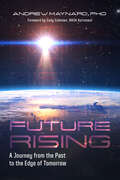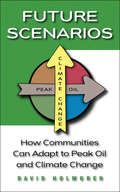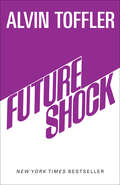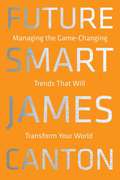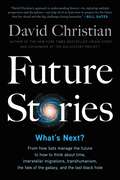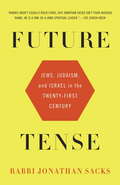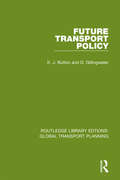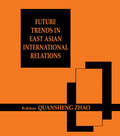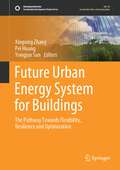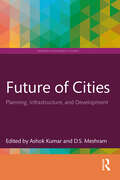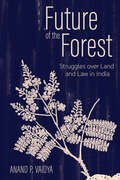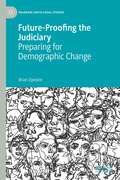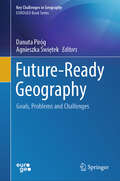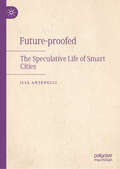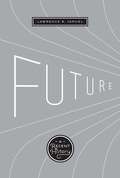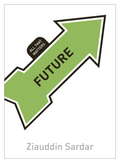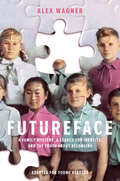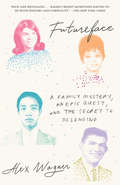- Table View
- List View
Future Perfect
by Steven JohnsonCombining the deft social analysis of Where Good Ideas Come From with the optimistic arguments of Everything Bad Is Good for You, New York Times bestselling author and one of the most inspiring visionaries of contemporary culture, Steven Johnson, maps the ways a connected world will be both different and better. Steven Johnson proposes that a new model of political change is on the rise transforming everything from local government to classrooms to health care. It's a compelling new political worldview that breaks with traditional categories of liberal or conservative thinking. Johnson explores this innovative vision through a series of fascinating narratives: from the "Miracle on the Hudson" to the planning of the French railway system; from the battle against malnutrition in Vietnam to a mysterious outbreak of strange smells in downtown Manhattan; from underground music video artists to the invention of the Internet itself. At a time when the conventional wisdom holds that the political system is hopelessly gridlocked with old ideas, Future Perfect makes the timely and uplifting case that progress is still possible.
Future Perspectives for Higher Education: A Delphi-based Scenario Study with Special Regard to Elite Higher Education Institutions and Leadership Education
by Nick LangeIn recent decades, trends, such as educational expansion and globalization, have caused structural changes in higher education worldwide. To successfully place higher education institutions in an environment characterized by global competition, various nations have launched excellence initiatives that pursue the goal of producing universities that attain the label of “excellent”, “world-class”, or “elite”. These institutions are perceived as developing future leaders who foster positive change in society. Against this background, initiatives that foster elite higher education institutions must include various institutional factors. To holistically design initiatives an understanding of what constitutes an elite higher education institution is necessary. Against the background of the institutions’ relevance for developing leaders for society, investigating their connection to leadership education must be addressed as well. This book adopts a future-oriented perspective, developing scenarios that consider a variety of future developments which influence higher education as a whole and elite institutions in particular.
Future Presence: How Virtual Reality Is Changing Human Connection, Intimacy, and the Limits of Ordinary Life
by Peter RubinA Wired senior editor and virtual reality expert presents a captivating, candid glimpse into the future "realities" of this emerging technology: how we will use it to form previously impossible relationships, explore new frontiers of intimacy, and how it will forever change human connection.Heralded as the most significant technological innovation since the smartphone, virtual reality is poised to transform our very notions of life and humanity. Though this tech is still in its infancy, to those on the inside, it is the future. VR will change how we work, how we experience entertainment, how we feel pleasure and other emotions, how we see ourselves, and most importantly, how we relate to each other in the real world. And we will never be the same.Peter Rubin, senior culture editor for Wired and the industry’s go-to authority on the subject, calls it an "intimacy engine." While once we needed another person to feel the sensations of closeness, trust, vulnerability, confidence, and titillation, VR will give us the ability to induce these sensations by ourselves for the first time in human history. This metamorphosis, Rubin argues, is going to have a powerful impact on relationships that will ripple throughout our society and our individual lives.A journey into this uncertain future and a glimpse at the cultural implications and promises of a new reality, Future Presence explores a host of complex questions about what makes us human, what connects us, and what is real. Offering a glimpse into the mind-blowing things happening in universities, labs, and tech companies around the world, Rubin leads readers on an entertaining tour of the weirdest, wildest corners of this fascinating new universe. Describing this book as "half travelogue and half crystal ball", Rubin will:Introduce readers to the creators and consumers of VR technologyShow readers what an experience is like inside the current VR devicesExplain how this technology will upend everything we know about human connection in the futureAt once the incredible, inevitable story of virtual reality’s rise and a look towards the future of our fantasies, Future Presence is a deeply personal examination of what connects us, and an analysis of what relationships, empathy, and sex could look like—sooner than we think.
Future Primitive Revisited
by John Zerzan"Zerzan's writing is sharp, uncompromising, and tenacious." -- Derrick Jensen "John Zerzan's importance does not only consist in his brilliant intelligence, his absolute clearness of analysis and his unequalled dialectical synthesis that clarifies even the most complicated questions, but also in the humanity that fills his thoughts of resistance. Future Primitive Revisited is one more precious gift for us all."--Enrico Manicardi, author of Liberi dalla Civiltá (Free from Civilization) "Anyone who travels with his eyes open understands the sense of much of what you have written, and the longer I live the greater my contempt for the opportunists who run governments and dictate our lives with technology."--Paul Theroux "Of course we should go primitive. This doesn't mean abandoning material needs, tools, or skills, but ending our obsession with such concerns. Declaring for community, our true origin: personal autonomy, trust, mutual support in pursuit of all the joys and troubles of life. Society was a trap--massive, demanding, impersonal and debilitating from day one. So hurry back to the community, friends, and welcome all the consequences of such an orientation. The reasons for fear and despair will only multiply if we remain in this brutal and dangerous state of civilization."--Blok 45 publishing, Belgrade As our society is stricken with repeated technological disasters, and the apocalyptic problems that go with them, the "neo-primitivist" essays of John Zerzan seem more relevant than ever. "Future Primitive," the core innovative essay of Future Primitive Revisited, has been out of print for years. This new edition is updated with never-before-printed essays that speak to a youthful political movement and influential writers such as Derrick Jensen and Paul Theroux. An active participant in the contemporary anarchist resurgence, John Zerzan has been an invited speaker at both radical and conventional events on several continents. His weekly Anarchy Radio broadcast streams live on KWVA radio.
Future Rising: A Journey from the Past to the Edge of Tomorrow (Analyzing The Future Ser.)
by Andrew MaynardA scientist offers compelling visions and potential pitfalls of the future—in &“a journey through time, space, and the human experience&” (Dr. Tanya Harrison, coauthor of For All Humankind). Humanity has gained the ability not only to imagine the future, but to design and engineer it. At times entertaining, and at others profound, Future Rising provides an original perspective on our relationship with the future. As a species, we&’ve become talented architects of our future—yet we often struggle to come to terms with what this means. As innovation and rapidly shifting norms and expectations drive our world at breakneck speed, we sometimes need to find a still, quiet place to pause and think. Future Rising creates such a place, where we can take advantage of our species&’ knowledge of world history and the importance of science to piece together a positive future. To create a good future, we must rediscover the past. Our relationship with the future is inextricably intertwined with where we&’ve come from, who we are, and what we aspire to. Future Rising starts at the beginning of all things with the Big Bang and traces a pathway along the emergence of intelligent life, through what makes humans uniquely capable of imagining and creating different futures. In a series of sixty short reflections, Andrew Maynard, a former physicist and nationally recognized expert in technology and society, will take you on a journey into: What &“the future&” actually isHow it molds and guides our livesHow we can use the history of the world to change our future &“A thoughtful and thought-provoking response to the moment we&’re in, chronicling how we got here, where we&’re going, and what role we have in that journey.&” —Ramona Pringle, Director of Creative Innovation Studio and Associate Professor, Ryerson University
Future Scenarios
by David HolmgrenIn Future Scenarios, permaculture co-originator and leading sustainability innovator David Holmgren outlines four scenarios that bring to life the likely cultural, political, agricultural, and economic implications of peak oil and climate change, and the generations-long era of "energy descent" that faces us. "Scenario planning," Holmgren explains, "allows us to use stories about the future as a reference point for imagining how particular strategies and structures might thrive, fail, or be transformed." Future Scenarios depicts four very different futures. Each is a permutation of mild or destructive climate change, combined with either slow or severe energy declines. Probable futures, explains Holmgren, range from the relatively benign Green Tech scenario to the near catastrophic Lifeboats scenario. As Adam Grubb, founder of the influential Energy Bulletin Web site, says, "These aren't two-dimensional nightmarish scenarios designed to scare people into environmental action. They are compellingly fleshed-out visions of quite plausible alternative futures, which delve into energy, politics, agriculture, social, and even spiritual trends. What they do help make clear are the best strategies for preparing for and adapting to these possible futures." Future Scenarios provides brilliant and balanced consideration of the world's options and will prove to be one of the most important books of the year.
Future Shock
by Alvin TofflerDescription of the world's response to change and how it affects our lives.
Future Shock
by Alvin TofflerNEW YORK TIMES BESTSELLER • The classic work that predicted the anxieties of a world upended by rapidly emerging technologies—and now provides a road map to solving many of our most pressing crises. &“Explosive . . . brilliantly formulated.&” —The Wall Street Journal Future Shock is the classic that changed our view of tomorrow. Its startling insights into accelerating change led a president to ask his advisers for a special report, inspired composers to write symphonies and rock music, gave a powerful new concept to social science, and added a phrase to our language. Published in over fifty countries, Future Shock is the most important study of change and adaptation in our time. In many ways, Future Shock is about the present. It is about what is happening today to people and groups who are overwhelmed by change. Change affects our products, communities, organizations—even our patterns of friendship and love. But Future Shock also illuminates the world of tomorrow by exploding countless clichés about today. It vividly describes the emerging global civilization: the rise of new businesses, subcultures, lifestyles, and human relationships—all of them temporary. Future Shock will intrigue, provoke, frighten, encourage, and, above all, change everyone who reads it.
Future Smart: Managing the Game-Changing Trends that Will Transform Your World
by James CantonGame-changing trends are coming in business, technology, workforce, economy, security, and environment. Climate change, energy demand, and population growth will redefine global risk and power. Exponential new technologies will emerge in digital money, mobile commerce, and big data. An explosive new middle class of over one billion consumers will enter the marketplace. Every nation, job, business, and person will be transformed. To thrive in this future you have to become predictive, adaptive, and agile--to become Future Smart. Dr. James Canton, a renowned global futurist and visionary business advisor, illuminates the pivotal forces and global power shifts that everyone must understand today to thrive in a rapidly changing landscape: Regenerative medicine will extend our lifetimes and rebuild our bodies Robots and drones will drive our cars, teach our kids, and fight our wars Smart machines will design, manage, and service 40% of all global businesses--energy, commerce, finance, and manufacturing--without humans Digital consumers who live always connected will challenge every business to change its strategy Climate change wars will redefine security and resources Most of us are not prepared to meet the challenges the future will bring, but these changes are coming fast. Armed with knowledge, those who are Future Smart can take action to reinvent themselves, their businesses, and their world.
Future Stories: What's Next?
by David ChristianThe New York Times bestselling author of Origin Story, who Bill Gates has &“long been a fan of,&” turns his attention to the future of humanity — and how we think about it — in this ambitious book. The future is uncertain, a bit spooky, possibly dangerous, maybe wonderful. We cope with this never-ending uncertainty by telling stories about the future, future stories. How do we construct those stories? Where is the future, the place where we set those stories? Can we trust our future stories? And what sort of futures do they show us? This book is about future stories and future thinking, about how we prepare for the future. Think of it as a sort of User&’s Guide to the Future. We all need such a guide because the future is where we will spend the rest of our lives. David Christian, historian and author of Origin Story, is renowned for pioneering the emerging discipline of Big History, which surveys the whole of the past. But with Future Stories, he casts his sharp analytical eye forward, offering an introduction to the strange world of the future, and a guide to what we think we know about it at all scales, from the individual to the cosmological. Christian consults theologians, philosophers, scientists, statisticians, and scholars from a huge range of places and times as he explores how we prepare for uncertain futures, including the future of human evolution, artificial intelligence, interstellar travel, and more. By linking the study of the past much more closely to the study of the future, we can begin to imagine what the world will look like in a hundred years and consider solutions to the biggest challenges facing us all.
Future Tense: Jews, Judaism, and Israel in the Twenty-First Century
by Jonathan SacksOne of the most admired religious thinkers of our time issues a call for world Jewry to reject the self-fulfilling image of "a people alone in the world, surrounded by enemies" and to reclaim Judaism's original sense of purpose: as a partner with God and with those of other faiths in the never-ending struggle for freedom and social justice for all. We are in danger, says Rabbi Jonathan Sacks, of forgetting what Judaism's place is within the global project of humankind. During the last two thousand years, Jews have lived through persecutions that would have spelled the end of most nations, but they did not see anti-Semitism written into the fabric of the universe. They knew they existed for a purpose, and it was not for themselves alone. Rabbi Sacks believes that the Jewish people have lost their way, that they need to recommit themselves to the task of creating a just world in which the divine presence can dwell among us. Without compromising one iota of Jewish faith, Rabbi Sacks declares, Jews must stand alongside their friends--Christian, Muslim, Hindu, Sikh, Buddhist, and secular humanist--in defense of freedom against the enemies of freedom, in affirmation of life against those who desecrate life. And they should do this not to win friends or the admiration of others but because it is what a people of God is supposed to do. Rabbi Sacks's powerful message of tikkun olam--using Judaism as a blueprint for repairing an imperfect world--will resonate with people of all faiths.From the Hardcover edition.
Future Transport Policy: The History Of A Subculture (Routledge Library Edtions: Global Transport Planning #6)
by D. Gillingwater K. J. ButtonOriginally published in 1986, this book remains as relevant today as when it was first published, as it discusses issues in transport policy that are still being debated: what levels of subsidies should be applied; what form of ownership should prevail; how transport should be regulated or deregulated; and which modes of transport should be favoured. The book examines how policies have evolved, and what factors affect present decision making. It includes contentious areas such as international airline deregulation and urban transport.
Future Trends in East Asian International Relations: Security, Politics, and Economics in the 21st Century
by Quansheng ZhaoThe world has undergone significant change since the end of the Cold War. One such development is that the Asia-Pacific has become increasingly prominent in international affairs. This comprehensive study provides a detailed understanding of key issues, actors and future trends in the region.
Future Urban Energy System for Buildings: The Pathway Towards Flexibility, Resilience and Optimization (Sustainable Development Goals Series)
by Xingxing Zhang Pei Huang Yongjun SunThis book investigates three main characteristics of future urban energy system for buildings, including flexibility, resilience and optimization. It explores the energy flexibility by considering renewable energy integration with buildings, sector coupling, and energy trading in the local energy market. Energy resilience is addressed from aspects of future climate change, pandemic crisis, and operational uncertainties. Approaches for system design, dynamic pricing and advanced control are discussed for the optimization of urban energy system. Knowledge from this book contributes to the effective means in future urban energy paradigm to closely integrate multiple energy systems (i.e., distribution, mobility, production and storage) with different energy carriers (i.e., heat, electricity) in an optimal manner for energy use. It would facilitate the envision of next-generation urban energy systems, towards sustainability, resilience and prosperity. This book targets at a broad readership with specific experience and knowledge in energy system, transport, built environment and urban planning. As such, it will appeal to researchers, graduate students, engineers, consultants, urban scientists, investors and policymakers, with interests in energy flexibility, building/city resilience and climate neutrality.
Future Youth: How to Reverse the Aging Process
by Carol KeoughA guide for those who want to stay young, that provides information on all the good food readers should eat, and what they should not. Exercise is another way of staying healthy and young, and this book provides the techniques.
Future of Cities: Planning, Infrastructure, and Development (Towards Sustainable Futures)
by Ashok Kumar D. S. MeshramThis book critically analyses the existing condition of cities in developing countries with special reference to planning and infrastructure networks in India. It provides an overview of the nature of opportunities presented by cities; major challenges that cities would face in future; and codifies the ways and means to transcend the challenges of contemporary urban growth and quality of urbanisation. It discusses key themes such as architecture of density, transformation of land-use zones to development zones, development of railway infrastructure, planning and design guidelines for bus rapid transit, and urban water planning and universal access to housing to create an enabling environment for deliberations and a better future for cities in the developing world. The book integrates insights from governance, planning, and design and highlights implications of spatial integration. It brings together current issues in Indian urbanisation, smart technologies used in building smart cities and high-rises, and urban and regional governance to explore forms of sustainable development planning that factor human needs. Accessible and topical, this book will be useful to scholars and researchers of urban studies, urban and city planning, development studies, sociology, public policy and administration, political sociology, anthropology, architecture, geography, and economics, as well as to professionals, planners, policymakers, and non-governmental organisations.
Future of the Forest: Struggles over Land and Law in India (Cornell Series on Land: New Perspectives on Territory, Development, and Environment)
by Anand P. VaidyaFuture of the Forest is the story of legal transformations of forests across India through collective action. Since the nineteenth century, Indian forest dwellers have been unable to enforce their claims to the land on which they live or the products of it that they use. But at the turn of the twenty-first century, a new national movement led to the passage of the Forest Rights Act, a landmark law that recognizes the tenure and use rights of India's millions of landless forest dwellers. Anand P. Vaidya tracks the Forest Rights Act from the movements that pushed for its passage to its drafting—and the many revisions it underwent to satisfy coalitions of local peoples, conservationists, and a wide spectrum of political parties and movements—and finally to its impact on two neighboring villages in central India's forest belt. The forests have seen a long history of political authority enacted to the benefit of the powerful; Future of the Forest follows the work of activists and forest dwellers who turned to the law to shift this balance of power.
Future-Proofing the Judiciary: Preparing for Demographic Change (Palgrave Socio-Legal Studies)
by Brian OpeskinThis book reinvigorates the field of socio-legal inquiry examining the relationship between law and demography. Originally conceived as 'population law' in the 1960s following a growth in population and a use of law to temper population growth, this book takes a new approach by examining how population change can affect the legal system, rather than the converse. It analyses the impact of demographic change on the judicial system, with a geographic focus on Australian courts but with global insights and it raises questions about institutional structures. Through four case studies, it examines how demographic change impacts on the judicial system and how should the judicial system adapt to embody a greater preparedness for the demographic changes that lie ahead? It makes recommendations for reform and speaks to applied demographers, socio-legal scholars, and those interested in judicial institutions.
Future-Ready Geography: Goals, Problems and Challenges (Key Challenges in Geography)
by Danuta Piróg Agnieszka ŚwiętekThis book presents research on how geography as a science, as a university degree and as a school subject can get ready for the “future.” Today's world is in a state of permanent and radical change which is affecting society, science and the economy in equal measure. The concurrent processes of globalisation, digitisation, and integration shape and constantly modify the development factors and generate multidirectional social changes. Growing global issues related to climate change, food security, depletion of conventional energy sources, conflicts and wars, refugee crisis and pandemic open up new issues for geographic investigations as well as reinforce the need to examine old research topics covering a variety of subdisciplines. That is why the term “future-ready” is being more frequently used in discourses on geographic research. In particular, geographic education at schools should be subject to discussion and reflection as this is where our learners are primed to understand the world around them. The chapters of this book spread the knowledge about the role of geography in preparing the society for the future. The book responds to environmental, socio-economic, and political issues of global, regional and local impact. It provides methods, techniques and tools of data collection and analysis which efficiently support geographers in future-oriented research and help in forecasting environmental and social changes. Finally, this volume also discusses how to reinforce the position of geography as science and school subject today and in the future.
Future-proofed: The Speculative Life of Smart Cities
by Ilia AntenucciEfficient, inclusive, sustainable: these are only some of the concepts through which smart cities have been marketed globally, over the past fifteen years at least. But what has really driven smart city projects, governance, and economies? This book argues it is speculation: not merely finance, but a much broader technopolitical force seeking to calculate and shape the future. Smart cities have been testbeds for new technological products, governed through preemptive analytics, and fuelled by high-risk financial investments. Drawing on case studies from Kolkata and Cape Town, this book illustrates how smart city technologies speculate on the future to govern and monetise the present. Today, smart cities might have lost some of their hype already, but their legacies are here to stay, and their ethical and political implications appear more critical than ever. This book offers insights into the speculative forces that undergird urban &‘smartness&’, and into their implications on everyday life, spatial justice, and citizens&’ rights.
Future: A Recent History
by Lawrence R. SamuelThe history of our attitudes toward the possibilities of tomorrow:&“A fascinating trek through American future visions from the 1920s to the present.&” —Lori C. Walters, Ph.D., University of Central Florida The future is not a fixed idea but a highly variable one that reflects the values of those who are imagining it. By studying the ways that visionaries imagined the future—particularly that of America—in the past century, much can be learned about the cultural dynamics of the times. In this social history, Lawrence R. Samuel examines the future visions of intellectuals, artists, scientists, businesspeople, and others to tell a chronological story about the history of the future in the past century. He defines six separate eras of future narratives from 1920 to the present day, and argues that the milestones reached during these years—especially related to air and space travel, atomic and nuclear weapons, the women&’s and civil rights movements, and the advent of biological and genetic engineering—sparked the possibilities of tomorrow in the public&’s imagination, and helped make the twentieth century the first century to be significantly more about the future than the past. The idea of the future grew both in volume and importance as it rode the technological wave into the new millennium, and the author tracks the process by which most people, to some degree, have now become futurists as the need to anticipate tomorrow accelerates.
Future: All That Matters
by Ziauddin SardarIn Future: All That Matters, Ziauddin Sardar shows that thinking and speculating about the future has always been a part of human history, but exploring the futures in a systematic and scientific way is a recent phenomenon. What is known variously as 'futures studies', 'futurology' or 'foresight' only emerged as a discipline during the last few decades. The study of the future, however, is not only about 'predicting' or 'forecasting' the future, which is always a perilous exercise. It is also about appreciating the potentials and possibilities, as well as risks and threats, lurking over the horizon. It can enable us both to avoid the dangers as well as shape a viable and desirable future.This book explores the exciting field of futures studies, and shows how knowledge of the future is acquired and put into practice. We examine various methods for studying the future, with the emphasis not so much on predicting specific events but on delineating alternative paths to the future. We look at some celebrated readings of the future as well as case studies where exploration of the future has been used to shape policy and planning in businesses and communities, international organisations and regional institutions, and interest and lobby groups. Finally, the book suggests why and how in an increasingly complex, uncertain and diverse world, the study of the future can help people recover their agency and help them to create the world in which they wish to live. This accessible and readable book will appeal both to students and general readers, giving a fascinating introduction to thinking about the future - and what matters most about it.
Future: All That Matters (All That Matters)
by Ziauddin SardarIn Future: All That Matters, Ziauddin Sardar shows that thinking and speculating about the future has always been a part of human history, but exploring the futures in a systematic and scientific way is a recent phenomenon. What is known variously as 'futures studies', 'futurology' or 'foresight' only emerged as a discipline during the last few decades. The study of the future, however, is not only about 'predicting' or 'forecasting' the future, which is always a perilous exercise. It is also about appreciating the potentials and possibilities, as well as risks and threats, lurking over the horizon. It can enable us both to avoid the dangers as well as shape a viable and desirable future.This book explores the exciting field of futures studies, and shows how knowledge of the future is acquired and put into practice. We examine various methods for studying the future, with the emphasis not so much on predicting specific events but on delineating alternative paths to the future. We look at some celebrated readings of the future as well as case studies where exploration of the future has been used to shape policy and planning in businesses and communities, international organisations and regional institutions, and interest and lobby groups. Finally, the book suggests why and how in an increasingly complex, uncertain and diverse world, the study of the future can help people recover their agency and help them to create the world in which they wish to live. This accessible and readable book will appeal both to students and general readers, giving a fascinating introduction to thinking about the future - and what matters most about it.
Futureface (Adapted for Young Readers): A Family Mystery, a Search for Identity, and the Truth About Belonging
by Alex WagnerFor anyone who is interested in genealogy and DNA profiling, this is the story of a journalist who travels the world to solve the mystery of her ancestry, facing questions about American identity and what it means to belong. Now adapted for young readers from the acclaimed adult memoir.Who are my people? Where am I from? With a Burmese mother and a white American father, Alex Wagner grew up thinking of herself as a "futureface"--an example of what the mixed-race future of America would look like. Her father's ancestors immigrated to the United States from Ireland and Luxembourg. Her mother fled Burma--now Myanmar--with her family in the 1960s.When Alex learns that her ancestry might be more mysterious than she believed, she becomes obsessed with learning everything there is to know about her ethnic and racial history. Her journey takes her from Burma to Luxembourg, from birth records written on banana leaves to high-tech genetic labs and online ancestry profiles.Through a blend of history, science, and sociology, Alex tries to solve the mysteries of her family and what it means to be American. What makes us think of certain people as "us" and others as "them"? In a time of conflict over who we are as a country, she tries to find the story where we all belong.Praise for the adult edition of Futureface"A thoughtful, beautiful meditation on what makes us who we are." --Barack Obama"Smart, timely, and moving." --Eddie Huang, bestselling author of Fresh Off the Boat"A rich and revealing memoir." --The New York Times
Futureface: A Family Mystery, an Epic Quest, and the Secret to Belonging
by Alex Wagner<P>An acclaimed journalist travels the globe to solve the mystery of her ancestry, confronting the question at the heart of the American experience of immigration, race, and identity: Who are my people? <P>Alex Wagner has always been fascinated by stories of exile and migration. Her father’s ancestors immigrated to the United States from Ireland and Luxembourg. Her mother fled Rangoon in the 1960s, escaping Burma’s military dictatorship. <P>In her professional life, Wagner reported from the Arizona-Mexico border, where agents, drones, cameras, and military hardware guarded the line between two nations. She listened to debates about whether the United States should be a melting pot or a salad bowl. <P>She knew that moving from one land to another—and the accompanying recombination of individual and tribal identities—was the story of America. And she was happy that her own mixed-race ancestry and late twentieth-century education had taught her that identity is mutable and meaningless, a thing we make rather than a thing we are. <P>When a cousin’s offhand comment threw a mystery into her personal story–introducing the possibility of an exciting new twist in her already complex family history—Wagner was suddenly awakened to her own deep hunger to be something, to belong, to have an identity that mattered, a tribe of her own. <P>Intoxicated by the possibility, she became determined to investigate her genealogy. So she set off on a quest to find the truth about her family history. <P>The journey takes Wagner from Burma to Luxembourg, from ruined colonial capitals with records written on banana leaves to Mormon databases and high-tech genetic labs. <P>As she gets closer to solving the mystery of her own ancestry, she begins to grapple with a deeper question: Does it matter? Is our enduring obsession with blood and land, race and identity, worth all the trouble it’s caused us? <P>The answers can be found in this deeply personal account of her search for belonging, a meditation on the things that define us as insiders and outsiders and make us think in terms of “us” and “them.” <P>In this time of conflict over who we are as a country, when so much emphasis is placed on ethnic, religious, and national divisions, Futureface constructs a narrative where we all belong.
